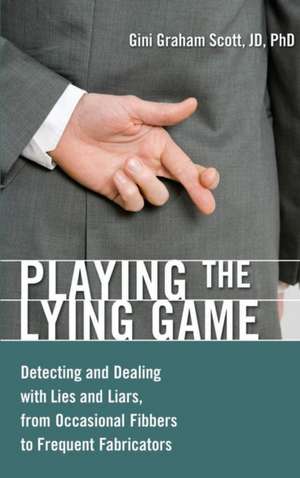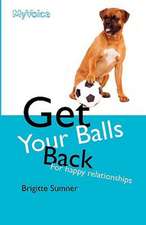Playing the Lying Game: Detecting and Dealing with Lies and Liars, from Occasional Fibbers to Frequent Fabricators
Autor Gini Graham Scott JD, Ph.Den Limba Engleză Hardback – mar 2010 – vârsta până la 17 ani
Preț: 307.94 lei
Preț vechi: 358.47 lei
-14% Nou
Puncte Express: 462
Preț estimativ în valută:
58.92€ • 61.52$ • 48.77£
58.92€ • 61.52$ • 48.77£
Carte tipărită la comandă
Livrare economică 05-19 aprilie
Preluare comenzi: 021 569.72.76
Specificații
ISBN-13: 9780313383519
ISBN-10: 0313383510
Pagini: 232
Ilustrații: 7
Dimensiuni: 156 x 235 x 28 mm
Greutate: 0.5 kg
Editura: Bloomsbury Publishing
Colecția Praeger
Locul publicării:New York, United States
ISBN-10: 0313383510
Pagini: 232
Ilustrații: 7
Dimensiuni: 156 x 235 x 28 mm
Greutate: 0.5 kg
Editura: Bloomsbury Publishing
Colecția Praeger
Locul publicării:New York, United States
Caracteristici
Includes a Lie-Q Test, so readers can see how lie-savvy they are
Notă biografică
Gini Graham Scott, JD, PhD, is a consultant, college instructor, and author of 38 books, including three with Greenwood/Praeger.
Cuprins
IntroductionPart I Why Do We All Lie?1 The Pervasiveness of LyingWhen Is Something a Lie?How Animals and Plants DeceiveThe Trickster Figure in Human MythThe Morality and Social Dynamics of Lying2 Why the Lie? The Reasons and Justifications for LyingTypes of LiesThe Reasons for LyingJustifying the LieReactions to the Lies of OthersPart II Identifying the Different Types of Liars3 How and Why Different Types of People LieThe Major Types of LiarsThe Parallels between Lying and Making Ethical ChoicesThe Major Ethical Approaches We Use in Everyday LifeThe Major Ethical ApproachesApplying the Major Ethical Approaches in Everyday LifeIntroducing the Ethical Choices MapThe Four Key Dimensions in Making ChoicesDifferent Ways of Making Choices in Different SituationsThe Zones of Making Ethical Choices and Choosing to Lie or NotAssessing Where You and Others Fall on the Ethical Choices ContinuumThe Style of Choice People UseDetermining Your Own Style of Making ChoicesAssessing Your Self/Other OrientationDetermining Your Own OrientationUnderstanding Your Philosophy or ValuesRecognizing Your Approach to the RulesAssessing Your Own Attitude to the RulesThe Relationship between Style, Orientation, Philosophy, and Attitude toward RulesUsing the Four Different Dimensions in Resolving an Ethical Dilemma4 Taking the Lie-Q Test: Learning Where You FitWhat's Your Lie-QPart III Lying in Public and Professional Life5 Everyday Social LiesCovering Up Real Feelings and OpinionsCreating a Better Image or AppearanceAvoiding Unpleasant or Undesirable ContactsLittle LiesDealing with Everyday Lies Yourself6 Lying in PublicWho Is Most Likely to LieLying to Neighbors7 Lying at WorkOrganizational LiesEmployer LiesSetting the ToneLying by EmployeesTo Get a Job or PromotionTo Make Excuses or Cover Up Delays, Lack of Work, and MistakesTo Obtain a Forbidden Goal or Take AdvantageTo Gain Alternate Goals or PrioritiesLying by Coworkers and ColleaguesGaining a Competitive AdvantageUndermining Other Employees8 Lying in BusinessLies to Look GoodTaking the Credit and Making Can-Do-It Claims When One Can'tLies for RevengeThe Case for Honesty and Ethics in BusinessPart IV Lying in Personal and Private Life9 Lying to Friends and RelativesLying to FriendsLies to Help and ProtectLies to Embellish and EntertainLack of Dependability and Follow-up LiesMoney LiesLies to End the FriendshipLying to RelativesLies of AvoidanceLies to ImpressLies about Money, Jealousy, and Revenge10 When Men and Women Lie-The Dating GameLies to YourselfLies to Avoid Getting Involved or More Involved in the RelationshipGetting Out of DatesLies to Avoid IntimacyLies to Exaggerate, Show Off, and Increase Self-EsteemPersuading by Use of Lies about What Others DoLies to Conceal an Important Truth about OneselfOther Lies to Get Sex or Avoid Uncomfortable Discussions about ItLies in the Heat of PassionLies about Seeing OthersMixing Lies, Love, and MoneyLies in FightsThe Response to LiesThe Desire for and the Dangers of Honesty11 Lies with Husbands, Wives, and Intimate OthersLies and SexLying and AffairsTypes of Concealments and JustificationsRevealing and Reaction to the LieLies to the Other Man or the Other WomanLies When the Marriage Ends12 The Lies of Parents and ChildrenWhat Parents Tell Children about LyingWhen Parents LieLies to Protect FeelingsLies to Conceal Opinions or Disapproval to Avoid Undue InfluenceLies to Conceal Inappropriate InformationLies to Get a Child to Do Something or Not Do SomethingWhen Children LieLies to Escape PunishmentLies to Conceal Unapproved ActivitiesLies to ImpressLies to Help and Protect OthersTeenage Dating Lies13 Lying to OneselfWhy the Self-Lie?The Forms Self-Denial and Lying TakeLying about One's Own Abilities or One's BusinessThe Effects of Self-Lying in RelationshipsLying to Oneself about Personal Problems and LimitationsOvercoming the Self-Lie14 The Strategy of Deceiving and PerceivingThe Success of DeceptionThe Strategies for Telling a LieThe Strategies for Perceiving a LieDiscovering LeakagesDiscovering Deception CluesMajor Clues in the Words, Voice, or BodyDiscovering Clues in the Overall Social ContextClues to Look ForConclusionTo Confront or Not to Confront the Lie?Is the Confrontation Worth It?The Importance of Being Diplomatic or TactfulWhen to Confess or What to Do about Getting CaughtSome Considerations on Whether to LieWhen to Reveal or Confess the LieThe Role of ForgivenessToward a Solution in Dealing with LyingLook at the Whys behind the LieBe Ready to Call People on Their LiesCreate a Supportive Environment for Truth TellingTell the Truth to YourselfUse the Truth for Building and Healing RelationshipsRecognize the Long-Term Advantages of Being Committed to the TruthAppendix: Ethical Choices Mapping InstrumentNotesIndex
Recenzii
Join me in reading this superlative treatise of contemporary social society, our new mores and old. And learn to survive The Lie.
Superbly written, informed and informative, Playing the Lying Game is very strongly recommended for personal reading lists and community library collections.
The book seems most appropriate for sociology or communications audiences interested in studying the dynamics between liars and those they lie to or in understanding strategies people use to justify lies. The author includes a plethora of in-depth interview quotes of liars, offering many examples of types of lies, who lies to whom, reasons for lying, and what to do with liars. . . . Scott presents an interesting perspective and summary of lying and liars.
Superbly written, informed and informative, Playing the Lying Game is very strongly recommended for personal reading lists and community library collections.
The book seems most appropriate for sociology or communications audiences interested in studying the dynamics between liars and those they lie to or in understanding strategies people use to justify lies. The author includes a plethora of in-depth interview quotes of liars, offering many examples of types of lies, who lies to whom, reasons for lying, and what to do with liars. . . . Scott presents an interesting perspective and summary of lying and liars.













